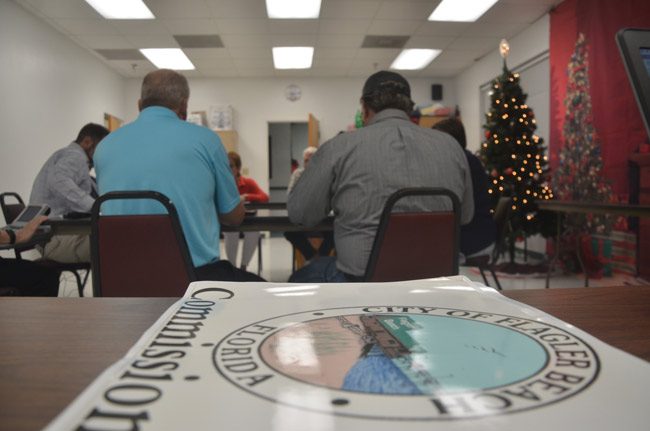
The Flagler Beach City Commission voted 5-0 Wednesday evening to seek out a settlement with Howard Sklar over the city’s 16-year dispute with his planned—and partly-built—marina on the Intracoastal Waterway.
The settlement would be largely in line with a court order issued last month, a split decision that sided with the city on three points and with Sklar on three, but that largely gave Sklar the advantage by unblocking further development and the operation of the marina.
The vote ended a 100-minute closed-door session the commission held at the city fire station. The decision means that the city is not interested in appealing or in a rehearing in circuit court—assuming it can work things out with Sklar and his attorneys. There was a sense of optimism at the end of the meeting Wednesday, at least for now contrasting with a history of disagreements. The signal difference in any breakthrough, though, is the court order, which neither side can ignore, but both may finesse in a settlement.
“Settlement agreements occur after the order frequently,” Drew Smith, the city’s attorney, said after the meeting. It avoids the risk of appeal, and helps “filling in any gaps in the court’s order, making sure the parties can move forward without having to involve the court again.”
“We each had some issues that we needed either to have Dale or Drew clarify for us,” Commission Chairman Jane Mealy said after the closed session, “some things we were not happy about they [meaning Sklar] were going to do.” Dale Scott is the other attorney on the case for the city. “There are parts in the settlement that we want them to delve into further,” Mealy added.
Sklar was not present, of course, as the session was exclusively for commissioners, their manager and their attorneys. The only exception was a court reporter, whose transcriptions of the meeting would be made public once the case is closed.
That may still be a few months away.
But issues remain, such as the definition of “manufacturing” as opposed to “assembling,” which goes to what sort of floating structures Sklar may build at the marina. Part of his plan, aside from boat slips, is to have live-aboard structures—essentially, floating houses—at the marina. Two of those are there now. The city had argued that manufacturing houses was not allowed there. Sklar had argued that he wasn’t manufacturing houses, but merely assembling them from pre-fabricated materials. The decision, by Circuit Court judge Scott DuPont found that “the assembly of boats at the Marina is a lawful, pre-existing and non-conforming use; however, the construction of boats, i.e., the creating and building of a boat from scratch or parts made on-site, is not.”
The court order was replete with similar technicalities that don’t resonate much with the public but that would set precedents for the city that it may not ant set—precedents that would tip the scope of development a bit further away from city structures and toward developer discretion. Negotiations will now focus on defining that scope, within the framework of the court order, which still leaves room for interpretation.
The exact motion by the commission, put forth by City Commissioner Marshal Shupe, is to “direct the attorneys to continue settlement discussions with the plaintiff’s attorney and attempt to flush out the proposed settlement agreement and work with the staff to identify any concerns or issues that staff may have.” Marshal read from a text drafted during the closed-door session. The motion also would “postpone” as much as possible any “further actions in expenditures related to rehearing or appeals.”
Smith translated the motion as an attempt to work things out “collaboratively instead of in opposition to one another, to avoid an appeal, to avoid arguments in the future, to avoid a lot of things.”
The success of the negotiations will dictate the timetable. “As long as they’re moving forward productively,” Smith said, “there’s really not a whole lot—as long as everybody’s preserved their right to appeal, which has happened here—there’s not really a time clock ticking on that. That’s more to do with, are the parties still moving forward, are the parties happy that they’re both moving forward in a collaborative fashion and there’s a potential for reaching a conclusion that everybody can accept.”
Smith put the timeline at “somewhere between weeks and months. Definitely not weeks, probably also not a great number of months. I would say six weeks to two and a half months.”
Should negotiations break down, there’s still another step before an appeal–a motion for a rehearing, which the city has already filed, which would help seek clarifications to certain points. “You’re not necessarily at each other’s throats but it’s an adversarial process in a motion for rehearing, just like an appeal is. Both sides are arguing their cases,” Smith said. But that’s what the settlement discussions are ideally going to avoid.






























DaveT says
I wonder how much money the Flagler Beach City Commission has wasted on this 16 year feud.
HonkeyDude says
I wonder how much $$$$ the marina, not including the restraunt, could have made in the last 16 yrs. Let’s see, on the cheap side, 50 slips at $2000 a month= $100,000 x 12 mths = $1,200,000 x 16yrs = $19,200,000.
I wonder what the city is planning on offering. A cool $20 mil??? Should we start a pool? Or will this take another 20 years???
Les says
This appears to be a personal vendetta by the city. All the commissioners involved in this should be ashamed of their behavior and forcing the taxpayers to be responsible for their poor decisions. Their pettiness is an embarrassment to us all.